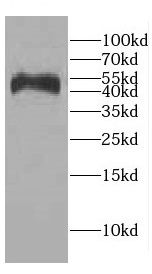FineTest
SKU(재고 관리 코드):FNab01579
anti- CEBPA antibody
anti- CEBPA antibody
Embark on a journey into the world of transcriptional control and cellular differentiation with our Anti-CEBPA Antibody, now available in a 100µg size. CEBPA, or CCAAT/enhancer-binding protein alpha, is a critical player in gene expression, influencing processes like adipogenesis, liver development, and hematopoiesis. This monoclonal antibody offers remarkable specificity and sensitivity, making it an indispensable tool for researchers exploring molecular biology, developmental biology, and the molecular mechanisms governing cellular differentiation.
With 100µg of this antibody, you'll have a substantial supply for various experiments, ensuring the continuity of your research. Delve into the intricacies of CEBPA and its role in transcription factor binding, its interactions with other regulatory proteins, and its potential implications in obesity research, liver diseases, and therapeutic interventions.
Product Name
CEBPA antibody
Size
100µg
Form
liquid
Purification
Immunogen affinity purified
Purity
≥95% as determined by SDS-PAGE
Host
Rabbit
Clonality
polyclonal
Isotype
IgG
Storage
PBS with 0.02% sodium azide and 50% glycerol pH 7.3, -20℃ for 12 months(Avoid repeated freeze / thaw cycles.)
BACKGROUND
Transcription factor that coordinates proliferation arrest and the differentiation of myeloid progenitors, adipocytes, hepatocytes, and cells of the lung and the placenta. Binds directly to the consensus DNA sequence 5'-T[TG]NNGNAA[TG]-3' acting as an activator on distinct target genes(PubMed:11242107). During early embryogenesis, plays essential and redundant functions with CEBPB. Essential for the transition from common myeloid progenitors(CMP) to granulocyte/monocyte progenitors(GMP). Critical for the proper development of the liver and the lung(By similarity). Necessary for terminal adipocyte differentiation, is required for postnatal maintenance of systemic energy homeostasis and lipid storage(By similarity). To regulate these different processes at the proper moment and tissue, interplays with other transcription factors and modulators. Downregulates the expression of genes that maintain cells in an undifferentiated and proliferative state through E2F1 repression, which is critical for its ability to induce adipocyte and granulocyte terminal differentiation. Reciprocally E2F1 blocks adipocyte differentiation by binding to specific promoters and repressing CEBPA binding to its target gene promoters. Proliferation arrest also depends on a functional binding to SWI/SNF complex(PubMed:14660596). In liver, regulates gluconeogenesis and lipogenesis through different mechanisms. To regulate gluconeogenesis, functionally cooperates with FOXO1 binding to IRE-controlled promoters and regulating the expression of target genes such as PCK1 or G6PC. To modulate lipogenesis, interacts and transcriptionally synergizes with SREBF1 in promoter activation of specific lipogenic target genes such as ACAS2. In adipose tissue, seems to act as FOXO1 coactivator accessing to ADIPOQ promoter through FOXO1 binding sites(By similarity). Isoform 3: Can act as dominant-negative. Binds DNA and have transctivation activity, even if much less efficiently than isoform 2. Does not inhibit cell proliferation(PubMed:14660596). Isoform 4: Directly and specifically enhances ribosomal DNA transcription interacting with RNA polymerase I-specific cofactors and inducing histone acetylation.
IMMUNOGEN INFORMATION
Immunogen
CCAAT/enhancer binding protein(C/EBP), alpha
Synonyms
CEBP
Observed MW
43-45 kDa
APPLICATION
Tested Application
ELISA, WB
Recommended Dilution
WB: 1:500-1:2000
UNIPROT INFORMATION
UniProt ID
IMAGES



